Journalist and editor Nastya Krasilnikova about favorite books
IN BACKGROUND "BOOK SHELF" we ask heroines about their literary preferences and editions, which occupy an important place in the bookcase. Today, the author of telegram channels "Daughter of the Robber" and "Your Mother!", Journalist and editor Nastya Krasilnikova, talks about favorite books.

 My sister and I grew up in Africa: we lived in different countries in Russian embassies. In closed areas there was, to put it mildly, a bit of entertainment and even less of their peers, so the books were the best (and sometimes the only) way to spend time with pleasure. Parents taught us to read with my sister very early - and all my happy memories of childhood are connected with books. I immediately became a drunken reader: I was always found with a flashlight under a blanket, then at five in the morning by the lamp in the living room.
My sister and I grew up in Africa: we lived in different countries in Russian embassies. In closed areas there was, to put it mildly, a bit of entertainment and even less of their peers, so the books were the best (and sometimes the only) way to spend time with pleasure. Parents taught us to read with my sister very early - and all my happy memories of childhood are connected with books. I immediately became a drunken reader: I was always found with a flashlight under a blanket, then at five in the morning by the lamp in the living room.
My favorite children's book - "Roni, the robber's daughter" Astrid Lindgren: in honor of her is called not only my telegram channel, but also my dog, which I took in 2011 from a shelter. The dog was given with a different nickname, to which it did not respond - I immediately understood that I would give it the name Roni (the dog quickly agreed with me). In my childhood in the book I was struck by two things: the fact that the main character was allowed absolutely everything, and that she tamed a wild horse (I adored horse riding and horses). Recently, I re-read the book and realized that it contains answers to any vital questions in general. Roni is my role model now: she is free, courageous, sincere and loyal.
Unfortunately, there was never a system in the way I read, and even now there isn’t. I always studied the school program earlier than necessary, and in a larger volume, I adored the poetry of the Silver Age, and I wrote a final essay on Bunin. I regret that we teach literature in the way that they teach: at school I did not have a single gifted teacher on this subject, I still cannot see the magic in the works of the "great Russian writers." Instead of magic, I see only brewing, quotations imposed in my teeth and "the theme of nature in the work of Alexander Sergeevich." A couple of years ago, she began to reread "War and Peace" and threw, after reading two volumes: she did not endure the misogyny that all pretty heroes of the author find. From Dostoevsky I always feel bad, including physically, I am very impressionable. Against this background, the novel “Demons” struck me: there were two or three jokes over which I laughed out loud at the whole subway car - maybe they were not that funny, but very much unexpected. Until now, sometimes I encourage myself with the phrase: "Stepan Trofimovich is resurrected and straightened."
At the university (I graduated from the Moscow State University Faculty of Journalism) I became an even more illegible reader, but I read it all the time. I, of course, love paper books, and my husband and my home library have not fit into any of the rented apartments for a long time, but with the birth of a child I had to switch to the Kindle - it is easier to carry around, and a curious baby will not be able to tear pages.
I prefer fiction to everything else - and nauchnopopu, and memoirs, and even more self-help-opus. For some reason, I despise the literature from the category “help myself”: I don’t understand how to spend time on it when there are so many magical art books in the world. I still think that reading fiction is the best way to develop imagination, and this is necessary for everyone whose work is somehow connected with creativity.
I regret that my inappropriate snobbery did not give me a chance to read the Potterian for a long time: my best friend Nastya Chukovskaya, in her third year of journalism, glistened with green eyes, talking about Harry's problems, and I sniffed with disdain: who could be interested in this childish nonsense about wizards! Then, when I finally read "The Deathly Hallows," I realized that this is great literature - I still envy today's children, because they can grow up in her arms.

Vasily Aksyonov
"Moscow Saga"
Vasily Aksyonov is an incomprehensibly talented writer, in his books I always fail, as if under ice, and during periods when I read it, I cannot concentrate on anything more than that. The Moscow Saga novel epic should be included in the school curriculum: it tells a lot more important things about us and our past than some kind of “Nedorosl” or “Lefty”. It is difficult and painful to read about collectivization, war, camps and repression, especially with Aksyonov - he describes all this so vividly - but at the same time this reading is very enriching. In addition, it is just a very fascinating literature.
Sergey Dovlatov
"Branch"
When we studied at junior courses, we adored Dovlatov. Everyone dreamed of writing like he, with his watchfulness and sharpness: as succinctly, precisely and suicidally. At night - then we called each other on the city phone - I was called by my best friend and classmate Ilya Zakharov and read Dovlatov aloud. It was fashionable to love "Solo on the Underwood", "Reserve" and "Suitcase", but I love the story "Branch" more than others. There, as always with Dovlatov, there are a lot of hilarious observations, but after reading you remain sad - maybe because in the relationship of the main characters it is easy to recognize dysfunctional relationships from your own youth.
John steinbeck
"The Grapes of Wrath"
This is probably the best book on how to remain a man in dark times: the novel tells about the life of people during the Great Depression in the United States. Even in Grapes of Wrath, the most monstrous and at the same time the most beautiful finale in the world - after reading the novel, I could not breathe for several days. In general, this book is so powerful in its emotional impact that I probably will never be able to re-read it.
Philip Pullman
Trilogy "Dark beginning"
Philip Pullman is considered a children's writer, but this is the case when the works of a children's writer should be read by everyone - I know even a few seventy people who could benefit from it. This is a wonderful trilogy about the wizarding world, the main character of which is the girl Lyra (I have a weakness for all books, where the main character is the heroine, not the hero, but they are still depressingly few).
All people in this magical world have daemon. Damon, who usually exists in the form of some animal, is the embodiment of the master's soul; according to the rules of this world, man cannot be divided with the daemon. It seems to me that this is a touching and beautiful metaphor - and yes, I would love to live in such a world. “Dark beginnings” reveal something very good and light inside - and are transferred to a place where you are guaranteed to be cool.
Nicole Krauss
"Chronicles of Love"
At the beginning of the tenths it was decided to read the novels of Jonathan Safran Foer and admire them. I also tremblingly love them, but the Nicole Krauss novel, his wives (they now seem to have diverged) made a greater impression on me - The Chronicles of Love. This is a book in a book, and the plot is very thin, without any bumps. In The Chronicles of Love, the incredible power of metaphor that you reread and then turn your head around for a long time, regretting a little that you did not invent them. In general, the real enjoyment of literature as art.
Robert Martin
"How we do it. Evolution and the future of human reproductive behavior"
If I could re-choose what to do in life, I would go to study biology: it seems to me, it is terribly exciting. Robert Martin's book about reproduction is more interesting than any detective story, it has a huge amount of important information about how the human reproductive system works. Outlined very accessible, sometimes even fun, and well remembered. My favorite chapter is about the biological differences in the brains of boys and girls (spoiler: there are almost none!), I read and literally jumped to the ceiling: I always suspected something like that, and then dear Robert finally confirmed this by reference to research. The book also has a very bright multi-colored cover, and I adore everything multi-colored.
Edward Limonov
"It's me, Edichka"
Well, what can I say? This is a great book about love.
Anastasia Izyumskaya and Anna Kuusmaa
"Mom at Zero. Parent Burnout Guide"
Before giving birth to a child, I had no idea what it was and how it changes everything inside and around. It turned out that motherhood is not at all like the "real female happiness" that all girls promise from childhood. On the contrary, it is hard work and a great test for the psyche. Therefore, I sincerely advise anyone who is going to give birth to a child (or recently gave birth and still can’t find the very promised happiness), read the book “Mom at Zero” - she helped me realize that everything is fine with me, I’m not “messing with fat, "not" invent "and not" exaggerating. " I will make a reservation that I have a number of stylistic claims to this book, but not one in content.
Artyom Efimov
"What did we get. Three centuries to understand Russia with the mind"
This book was written by my husband, he is a historian. This is a book about people thanks to whom Russia has its history - the biographies of those who created Russian historical science. I, of course, biased. Imagine, I live with a man who wrote a popular science book! I still do not fit in my head - and sometimes, remembering this, I come to a child's delight. And I have a child from him! And yet: this is a cool book, it is famously drawn with our ideas about Russia and its history - if you have a familiar patriot, an excellent gift will come out.




